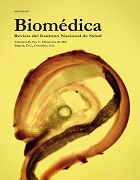Molecular characterization of an outbreak of carbapenem-resistant Klebsiella pneumoniae in a tertiary care hospital in Medellín, Colombia
Abstract
Introduction: Resistance to carbapenems is considered to represent a serious threat to public health at the global level, since these antibiotics are one of the last therapeutic options for the treatment of multidrug-resistant bacteria. Molecular characterization of outbreaks due to resistant bacteria provides information that can be used in the design of infection control strategies.
Objective: To describe the molecular characteristics of an outbreak of carbapenem-resistant Klebsiella pneumoniae that occurred in a tertiary care hospital in Medellín in 2010-2011.
Materials and methods:Eighty-four isolates were obtained from a collection of strains associated with the hospital outbreak, of which 32 were from patients infected at that time and 52 were carriers. Identification and susceptibility of the isolates was performed using Vitek2®. Carbapenemases were detected using a modified Hodge test and polymerase chain reaction. Genetic relationships between the isolates were evaluated using pulsed field gel electrophoresis and multiple locus sequence typing.
Results: All the isolates analyzed were multidrug resistant; molecular analysis revealed that all harbored blaKPC-3. The genetic analysis showed that 58/64 of the isolates from both infected and colonized patients were closely related (Dice similarity index >80%) and belonged to the ST258 lineage.
Conclusion: Using molecular typing techniques it was possible to confirm the occurrence of an outbreak caused by K. pneumoniae ST258, a carrier of blaKPC-3 with a multidrug-resistant profile which had been associated with a previous outbreak in another hospital in the city of Medellín. ST258 is a high risk clone at the global level, demonstrating the potential for dissemination of resistance in this country. Implementation of molecular tools in support of epidemiological surveillance is useful for evaluating the spread of microorganisms of public health significance.
Downloads
Some similar items:
- Nora Cardona-Castro, Lelia Lavalett, Miryan Margot Sánchez, Nélida Múñoz, Jaime Moreno, Development and validation of a multiplex polymerase chain reaction for molecular identification of Salmonella enterica serogroups B, C2, D and E , Biomedica: Vol. 29 No. 2 (2009)
- Ana Victoria Suescún, Juan Rodrigo Cubillos, María Mercedes Zambrano, Genes involved in fimbrial biogenesis affect biofilm formation in Klebsiella pneumoniae , Biomedica: Vol. 26 No. 4 (2006)
- Ingrid Yamile Pulido, José Ramón Mantilla, Emilia María Valenzuela, María Teresa Reguero, Elsa Beatriz González, Distribution of extended spectrum β-lactamases-codifying genes in Klebsiella pneumoniae isolates from hospitals of Bogota, D.C., Colombia , Biomedica: Vol. 31 No. 1 (2011)
- José Ramón Mantilla, María Teresa Reguero, Elsa Beatriz González, Ibonne Ayde García, Aura Lucía Leal, Paula Andrea Espinal, Celia Alpuche, Ismael Alberto Valderrama, Martha Isabel Garzón, Narda María Olarte, Molecular characterization of an outbreak caused by CTX-M-12-producing Klebsiella pneumoniae in a Colombian hospital´s neonatal intensive care unit , Biomedica: Vol. 26 No. 3 (2006)
- Beatriz Millan, David Castro, Maria Araque, Bárbara Ghiglione, Gabriel Gutkind, ISCR1 associated with blaCTX-M-1 y blaCTX-M-2 genes in IncN and IncFIIA plasmids isolated from Klebsiella pneumoniae of nosocomial origin in Mérida, Venezuela , Biomedica: Vol. 33 No. 2 (2013)
- Paula Andrea Espinal, José Ramón Mantilla, Carlos H. Saavedra, Aura Lucía Leal, Celia Alpuche, Emilia María Valenzuela, Molecular epidemiology of nosocomial infection by extended-spectrum beta-lactamases-producing Klebsiella pneumoniae. , Biomedica: Vol. 24 No. 3 (2004)
- Sonia Isabel Cuervo, Ricardo Sánchez, Julio César Gómez-Rincón, Cielo Almenares, Juan Pablo Osorio, María José Vargas, Behavior of carbapenemase-producing Klebsiella pneumoniae cases in cancer patients at a third level hospital in Bogotá, D.C. , Biomedica: Vol. 34 (2014): Abril, Suplemento 1, Resistencia bacteriana
- Martha C. Domínguez, Mercedes Salcedo, Felipe García, Serological and virological evaluation of human T-lymphotropic virus type 1 infection in family groups from Tumaco, Colombia , Biomedica: Vol. 35 No. 3 (2015)
- Clemencia Ovalle-Bracho, Carolina Camargo, Yira Díaz-Toro, Marcela Parra-Muñoz, Molecular typing of Leishmania (Leishmania) amazonensis and species of the subgenus Viannia associated with cutaneous and mucosal leishmaniasis in Colombia: A concordance study , Biomedica: Vol. 38 No. 1 (2018)
- Yasmin Varela, Beatriz Millán, María Araque, Genetic diversity of extraintestinal Escherichia coli strains producers of beta-lactamases TEM, SHV and CTX-M associated with healthcare , Biomedica: Vol. 37 No. 2 (2017)
| Article metrics | |
|---|---|
| Abstract views | |
| Galley vies | |
| PDF Views | |
| HTML views | |
| Other views | |


























